泛读答案(一)
泛读教程1修订版课后练习题含答案
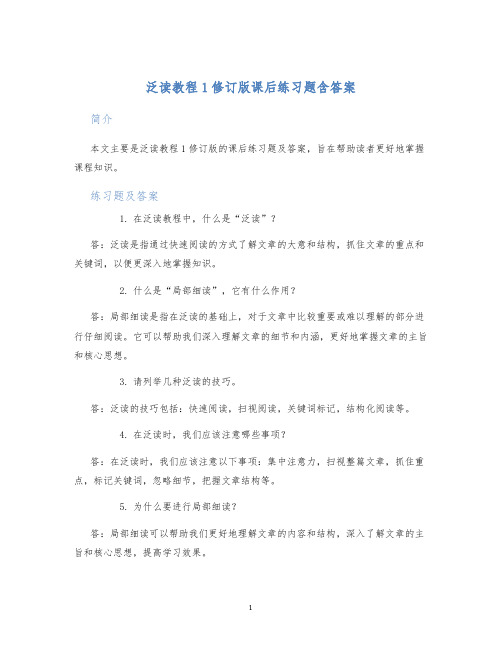
泛读教程1修订版课后练习题含答案简介
本文主要是泛读教程1修订版的课后练习题及答案,旨在帮助读者更好地掌握课程知识。
练习题及答案
1.在泛读教程中,什么是“泛读”?
答:泛读是指通过快速阅读的方式了解文章的大意和结构,抓住文章的重点和关键词,以便更深入地掌握知识。
2.什么是“局部细读”,它有什么作用?
答:局部细读是指在泛读的基础上,对于文章中比较重要或难以理解的部分进行仔细阅读。
它可以帮助我们深入理解文章的细节和内涵,更好地掌握文章的主旨和核心思想。
3.请列举几种泛读的技巧。
答:泛读的技巧包括:快速阅读,扫视阅读,关键词标记,结构化阅读等。
4.在泛读时,我们应该注意哪些事项?
答:在泛读时,我们应该注意以下事项:集中注意力,扫视整篇文章,抓住重点,标记关键词,忽略细节,把握文章结构等。
5.为什么要进行局部细读?
答:局部细读可以帮助我们更好地理解文章的内容和结构,深入了解文章的主旨和核心思想,提高学习效果。
结语
以上就是泛读教程1修订版课后练习题及答案,希望对读者有所帮助。
同时,我们也要认识到,泛读只是一种阅读方法,不是解决所有问题的方法,我们还需要在实践中不断探索,不断提升自己的阅读技巧和水平。
英语泛读教程1答案(精编文档).doc
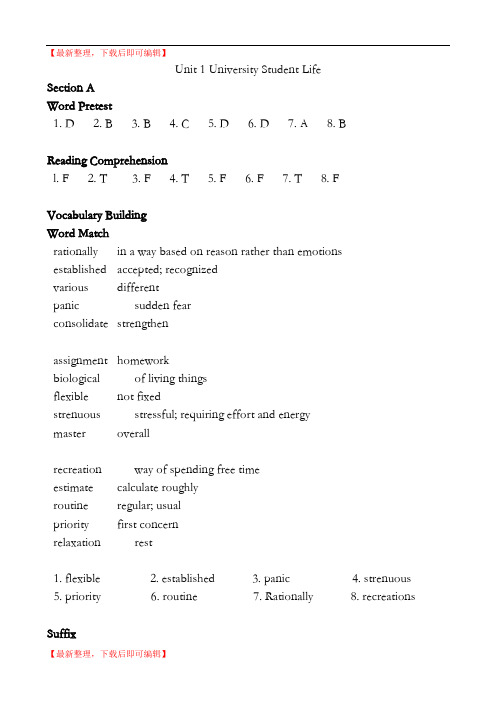
【最新整理,下载后即可编辑】Unit 1 University Student LifeSection AWord Pretest1. D2. B3. B4. C5. D6. D7. A8. BReading Comprehensionl. F 2. T 3. F 4. T 5. F 6. F 7. T 8. F Vocabulary BuildingWord Matchrationally in a way based on reason rather than emotions established accepted; recognizedvarious differentpanic sudden fearconsolidate strengthenassignment homeworkbiological of living thingsflexible not fixedstrenuous stressful; requiring effort and energymaster overallrecreation way of spending free timeestimate calculate roughlyroutine regular; usualpriority first concernrelaxation rest1. flexible2. established3. panic4. strenuous5. priority6. routine7. Rationally8. recreations Suffix1. familiarize2. visualize3. merely4. idealize5. finalize6. necessarily7. physically8. highly Clozefavorable their respected professors authority role expect need several changes Section B1. D2. C3. C4. B5. C6. B7. D8. D Section Cl. D 2. A 3. B 4. D 5. C 6. B 7. C 8. AUnit 2 Culture ShockSection AWord Pretest1. C2. A3. D4. C5. C6. B7. A8. D Reading Comprehension1. C2. D3. D4. D5. D6. CVocabulary BuildingWord Matchexaggerate say more than the truth about something slang nonstandard vocabularyadapt make or become suitableinsecure weak; uncertain; unprotecteddistinct different; separatechallenging difficult, but in an interesting wayrange vary within limitsadjust change slightly in order to make suitableaggressive ready for conflictcope with deal withoccur happenidentity the distinguishing character or personality of an individual automatic self-acting; under its own powerdistortion twist; changing shapereverse opposite; contraryl. slang 2. exaggerate 3. cope with 4. reverse5. adapt / adjust6. range / ranged7. occurred8. aggressive Suffixl. dividable / divisible 2. determination 3. dependable 4. satisfaction 5. correction 6. relation 7. usable / useable 8. recognizableClozeforeign anxious behavior mean necessarilyappear unsure approach frustrations systemSection Bl. C 2. B 3. D 4. C 5. C 6. D 7. B 8. DSection Cl. C 2. B 3. B 4. D 5. B 6. C 7. A 8. DUnit 3 MovieSection AWord Pretestl. B 2. D 3. B 4. C 5. D 6. B 7. A 8. DReading Comprehensionl. C 2. D 3. B 4. C 5. D 6. B 7. C 8. A Vocabulary BuildingWord Matchnominee candidatecreate make; inventstare look at for a long timereduce decrease; make lessoverhear accidentally hear what others are sayingimpress fill someone with admirationexpense costvictim one who is harmed or killedfloat stay on the surface of the watercynicism distrustminiature small; tinysubstitute something / somebody that takes the place of another grateful thankfulscrape scratch awayillusion false impressionl. scrape 2. grateful 3. substitute 4. expenses5. reduce6. staring7. impressed8. floatsSuffixl. confidence 2. distance 3. devilish 4. presence5. importance6. childish7. patience8. appearance Clozestars drawings movies love rememberkinds serious well-known collect hangingSection Bl. D 2. C 3. C 4. D 5. C 6. D 7. A 8.D Section Cl. T 2. T 3. T 4. T 5. F 6. F 7. T 8. TUnit 4 FoodSection AWord Pretestl. C 2. C 3. C 4. B 5. A 6. C 7. B 8. B Reading Comprehensionl. C 2. B 3. C 4. B 5. A 6. C 7. B 8. C Vocabulary BuildingWord Matchflavor tastecompliment praisevegetarian one who does not eat meatdairy relating to milk or milk productingredient any of the things that are formed into a mixture dessert sweet food served after the main part of a mealdiet food and drink usually taken by a personbarbecue cook food on a metal frame outdoorscuisine food cooked in a particular styleappetizer food or drink taken to increase the desire for food courteous polite and kindstaple basic foodportion part of something largerdough flour mixed with water ready for bakingsufficient enoughl. courteous 2. flavor 3. staple 4. ingredients5. barbecue6. compliment7. portion8. sufficientPrefixl. disagrees 2. misunderstands 3. disappearance 4. misleading 5. disadvantage 6. misfortune 7. discourage 8. misinterpretedClozeingredients called hands increase rising allowed final ovenSection Bl. A 2. D 3. C 4. B 5. A 6. D 7. C 8. BSection Cl. A 2. C 3. B 4. C 5. B 6. B 7. C 8. BUnit 6 SportsSection AWord Pretestl. C 2. B 3. B 4. A 5. C 6. C 7. A 8. CReading Comprehensionl. T 2. F 3. T 4. F 5. F 6. T 7. T 8. F Vocabulary BuildingWord Matchboulevard a wide road in a city with lined trees along itfervent passionateconquer win; defeatpropose make an offer of marriagemessenger a person who brings messagesembrace clasp in the arms; hugpop burst open with a short, quick, explosive soundmotto a short expression of a guiding principlemillennium a period of 1,000 yearsbribery giving or taking a gift in order to do something dishonest exhausted very tiredstadium a large sports-ground with seats for spectatorscommittee a group of people selected to do something specialmodal a piece of metal given to a person as an honorathlete a person who is good at sport1. exhausted2. athlete3. motto4. bribery5. embraced6. committee7. proposed8. medalSuffix1. Egyptian2. Spanish3. British4. scholarship5.Roman6. relationship7. Portuguese8. leadershipClozegames list week wins name divided think lowerSection B1. B2. C3. F4. T5. T6. F7. A8. C9. C 10. C Section C1. F2. T3. F4. F5. F6. F7. T8.F9. T 10. TUnit 7 ShynessSection AWord Pretest1. C2. C3. C4. A5. C6. B7. B8. C Reading Comprehension1. F2. T3. F4. T5. F6. T7. T8. F Vocabulary BuildingWord Matchstumble speak in an uncertain waytentative not certainspouse husband or wifesignal a sound or action intended to give a messagebrood spend time thinking sadly about something intelligent having powers of learning, reasoning or understanding potential possibility for developmentwander move about without a fixed purposescold criticize in an angry waytyrant a person who uses power cruelly and unjustlystride walk with quick, long stepsintimidate threaten: frightencommitted having made a firm promiseinherit receive something from one's parentspersonality character; individualityl. signal 2. tentative 3. personality 4. committed5. scolded6. brooding7. wandering8. stridingSuffixl. government 2. peaceful 3. statement 4. engagement5. destructive6. disagreement7. effective8. helpfulClozepeople women worse interview public position differently service low physicalSection Bl. F 2. T 3. T 4. T 5. F 6. T 7. F 8.T 9. B 10. C Section Cl. B 2. B 3. B 4. B 5. C 6. B 7. A 8.BUnit 11 AdvertisingSection AWord Pretest1. B2. A3. B4. A5. B6. C7. B8. CReading Comprehension1. C2. B3. B4. C5. A6. B7. B8. CVocabulary BuildingWord Matchcampaign a series of activities for a particular aimtransmission passing something from one person or place to another substantial l arge in size, value or importancevacuum a space with nothing at all in itliteracy the ability to read and writestimulate encourage something to grow, develop or become activetune-up adjust (an engine) to improve performancemilestone an important eventreinforce make something strongerconnotation feelings or ideas that are suggested by a word manufacturer producershade slight differenceassociate connectremarkable extraordinaryfeature play an important partl. associate 2. substantial 3. literacy 4. milestone5. remarkable6. connotation7. features8. shadesPrefixl. reconsideration 2. overpraised 3. replace 4. overwork 5. regain 6. overweight 7. recall 8. overanxious Clozemoney attempt persuade growingpreference advertisers rational unconsciousSection Bl. C 2. B 3. C 4. B 5. B 6. C 7. B 8. C Section Cl. T 2.T 3.T 4.F 5.F 6.F 7.F 8.F 9.F 10. T。
大学英语泛读 第三版 第二册 (张砚秋 著) 外研社 课后答案 泛读1答案Unit1-2
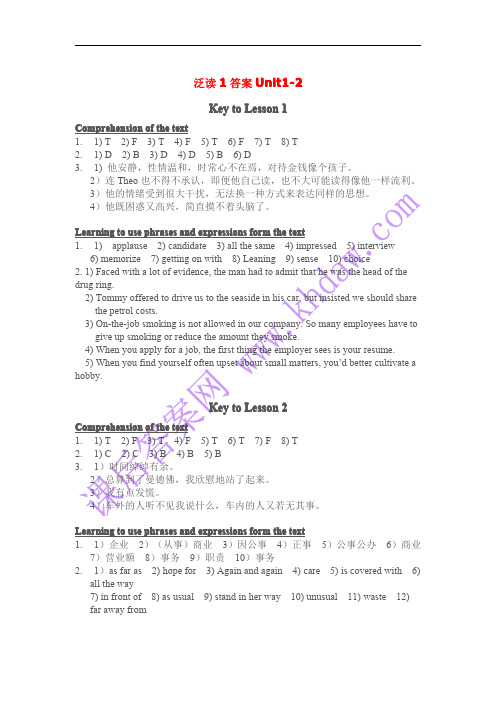
泛读1答案Unit1-2Key to Lesson11.1)T2)F3)T4)F5)T6)F7)T8)T2.1)D2)B3)D4)D5)B6)D3.1)他安静,性情温和,时常心不在焉,对待金钱像个孩子。
2)连Theo也不得不承认,即便他自己读,也不大可能读得像他一样流利。
3)他的情绪受到很大干扰,无法换一种方式来表达同样的思想。
4)他既困惑又高兴,简直摸不着头脑了。
interviewchoiceof theshould sharehave tocultivate a Learning to use phrases and expressions form the text1.1)企业2)(从事)商业3)因公事4)正事5)公事公办6)商业7)营业额8)事务9)职责10)事务2.1)as far as2)hope for3)Again and again4)care5)is covered with6)all the way7)in front of8)as usual9)stand in her way10)unusual11)waste12)far away from1.1)T2)F3)F4)T5)F6)T7)F8)T2.1)D2)B3)A4)D5)C3.1)我看他快气疯了。
2)然后他说:“你等着瞧吧,有你好看的。
”3)我的两只箱子也给我带来了不少麻烦。
Learning to use phrases and expressions form the text1.1)got hot2)at the end of3)taken the place of4)made so much noise5)at the same time6)get through7)in the air8)look through9)made signs10)lost the hope of2.1)above2)over3)through4)out of5)about6)next to7)in8)at40英里7)follow4)The German base from which they had been attacked lay about sixty kilometersto the west of the front line.5)Although being early may mean wasting a little time,this will be less than ifyou miss the train and have to wait an hour or more for the next one.6)I had been told that the hotel was not beautiful but you were better fed therethan in any other place in London;---and that was what I wanted then.1.1)T2)T3)F4)F5)F6)F7)T8)T2.1)C2)D3)C4)D5)A6)A3.1)风把我的帽子吹到路上,我跑下了人行道去捡了回来。
大学英语泛读 第三版 第二册 (张砚秋 著) 外研社 课后答案 泛读1答案Unit5-6

泛读1答案Unit5-6Key to Lesson131.1)F2)T3)F4)T5)F6)T7)T8)F9)F10)T2.1)B2)D3)C4)D5)A6)C3.1)他教给学生的东西他从不要他们交费。
2)在他之前,多数哲学家对研究我们现在称之为魔法或迷信的学科感兴趣。
3)相反,他总是就学生们所想的并信以为真的事情对他们提出层出不穷的问题。
4)一个人认识自我有助于他成为勇者。
5)终于他的敌人将他逮捕,他被判处死刑。
long hours.5)“她父亲可能会扣压我们的信件。
”6)我们经常拿我年轻时的这段恋爱开玩笑。
7)“在丹麦或其他欧洲国家不是这样写日期的。
”8)“你们这段恋情这样结束挺好,不然你就不会遇见妈妈了”。
Learning to use phrases and expressions from the text:1.1)If the doctor had worn a mask,he would not have caught germs from the patient.2)If the thief had worn gloves,he would not have left his fingerprints all over the place.3)If he were here,he would help me to get through the difficulties.4)If the film had been shorter,it would have held children’s attention.5)I wish you would look at the positive side of your husband.He is hard-working andeasy-going.6)If there were a fire,your customers would be trapped inside.You have only oneemergency exit on the ground floor.7)The doctor suggests that I run two miles and do50sit-ups every other day.8)If someone offered to pay for a holiday for me,I would go round the world.2.1)To buy the home,the young couple got a loan from the bank and they had to pay back theloan in20years.2)Sue felt embarrassed when the teacher caught her peering at her neighbor’s test paper.3)Before you buy a car,you’d better know what services the car dealer offers.4)Ann strongly objected to her husband’s suggestion that she quit her job and stay home to lookafter the kids.up.So we had totwo police2.1)A.the sound that a weapon makes B.an injection of a drug2)A.a sum of money kept in a bank B.description3)A.ability to understand or make judgments B.a meaning4)A.likely to have B.something being talked about5)A.give B.here/there6)A.a person that somebody pays attention to B.be against,show oppositionTest Paper OneI. 1.dependent on 2.replace 3.suspicious 4.cultivating5.object to6.subject to7.admire8.consequences9.In case10.at the top of11.casual12.cut down13.at least14.dull15.is accused ofII. 1.of 2.by 3.to 4.Under 5.of6.inside7.from8.outside9.from10.into11.to12.into13.out of14through15.to16.on17.within18.Through19.by20.forIII.1.One danger of superstition is that is encourages people to believe that their future is entirely out of their own hands.2.Many medicines have been developed to cure pains of every kind,and almost withoutexception they have some effects on the brain.3.This kind of application form usually asks for personal information and educationalbackground.4.When you are caught in a situation you can neither escape nor change,humor may be thebest way to relieve stress.5.Peter was accused of attempted robbery and the judge sentenced him to three months’imprisonment.IV.1.C 2.B 3.D 4.B 5.A 6.C7.C8.D9.B10.CKey to Lesson166)T7)F8)F9)F10)T6)D只有专家才看得出破绽。
泛读教程第一册答案(1)
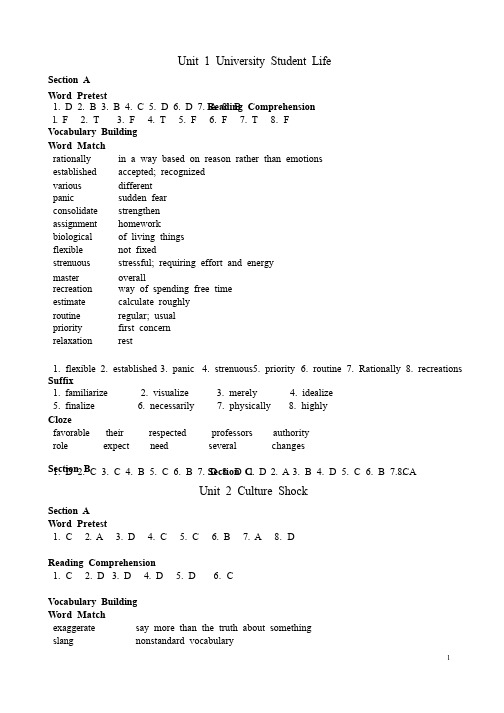
miniature substitute grateful scrape illusion
small; tiny something / somebody that takes the place of another thankful scratch away false impression
dessert diet barbecue cuisine appetizer
sweet food served after the main part of a meal food and drink usually taken by a person cook food on a metal frame outdoors food cooked in a particular style food or drink taken to increase the desire for food
Vocabulary Building
Word Match
dispute
an argument or disagreement
enterprise businesghtened successor
real; true showing true and deep understanding a person or thing that follows another
Word Match
rationally in a way based on reason rather than emotions
established accepted; recognized
various panic
different sudden fear
英语泛读教程1第3版参考答案
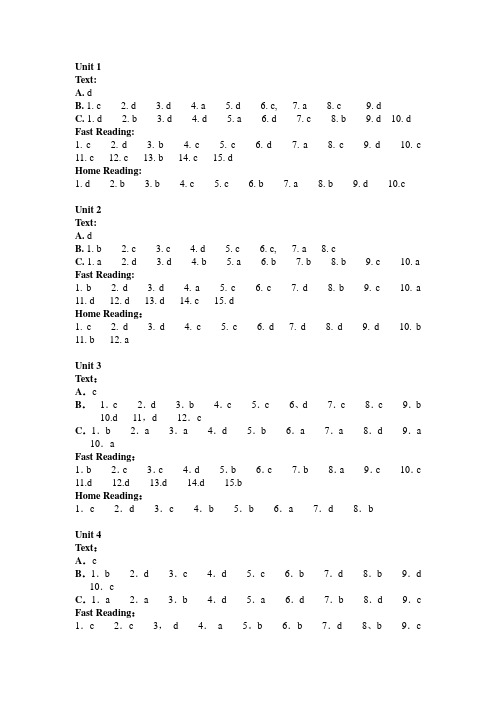
Unit 1Text:A. dB. 1. c 2. d 3. d 4. a 5. d 6. c, 7. a 8. c 9. dC. 1. d 2. b 3. d 4. d 5. a 6. d 7. c 8. b 9. d 10. d Fast Reading:1. c2. d3. b4. c5. c6. d7. a8. c9. d 10. c 11. c 12. c 13. b 14. c 15. dHome Reading:1. d2. b3. b4. c5. c6. b7. a8. b9. d 10.c Unit 2Text:A. dB. 1. b 2. c 3. c 4. d 5. c 6. c, 7. a 8. cC. 1. a 2. d 3. d 4. b 5. a 6. b 7. b 8. b 9. c 10. a Fast Reading:1. b2. d3. d4. a5. c6. c7. d8. b9. c 10. a 11. d 12. d 13. d 14. c 15. dHome Reading:1. c2. d3. d4. c5. c6. d7. d8. d9. d 10. b 11. b 12. aUnit 3Text:A.cB.1.c 2.d 3.b 4.c 5.c 6、d 7.c 8.c 9.b10.d 11,d 12.cC.1.b 2.a 3.a 4.d 5.b 6.a 7.a 8.d 9.a 10.aFast Reading:1.b 2.c 3.c 4.d 5.b 6.c 7.b 8.a 9.c 10.c 11.d 12.d 13.d 14.d 15.bHome Reading:1.c 2.d 3.c 4.b 5.b 6.a 7.d 8.bUnit 4Text:A.cB.1.b 2.d 3.c 4.d 5.c 6.b 7.d 8.b 9.d 10.cC.1.a 2.a 3.b 4.d 5.a 6.d 7.b 8.d 9.c Fast Reading:1.c 2.c 3,d 4.a 5。
大学英语泛读试题及答案
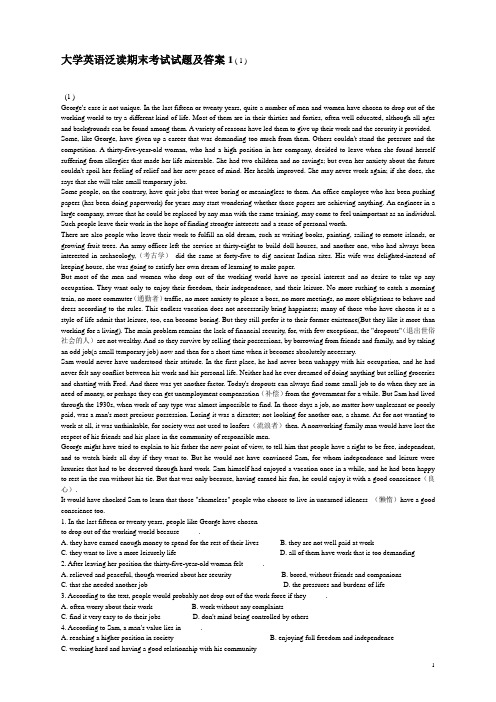
大学英语泛读期末考试试题及答案1 ( 1 )(1 )George's case is not unique. In the last fifteen or twenty years, quite a number of men and women have chosen to drop out of the working world to try a different kind of life. Most of them are in their thirties and forties, often well educated, although all ages and backgrounds can be found among them. A variety of reasons have led them to give up their work and the security it provided. Some, like George, have given up a career that was demanding too much from them. Others couldn't stand the pressure and the competition. A thirty-five-year-old woman, who had a high position in her company, decided to leave when she found herself suffering from allergies that made her life miserable. She had two children and no savings; but even her anxiety about the future couldn't spoil her feeling of relief and her new peace of mind. Her health improved. She may never work again; if she does, she says that she will take small temporary jobs.Some people, on the contrary, have quit jobs that were boring or meaningless to them. An office employee who has been pushing papers (has been doing paperwork) for years may start wondering whether those papers are achieving anything. An engineer in a large company, aware that he could be replaced by any man with the same training, may come to feel unimportant as an individual. Such people leave their work in the hope of finding stronger interests and a sense of personal worth.There are also people who leave their work to fulfill an old dream, such as writing books, painting, sailing to remote islands, or growing fruit trees. An army officer left the service at thirty-eight to build doll houses, and another one, who had always been interested in archaeology,(考古学)did the same at forty-five to dig ancient Indian sites. His wife was delighted-instead of keeping house, she was going to satisfy her own dream of learning to make paper.But most of the men and women who drop out of the working world have no special interest and no desire to take up any occupation. They want only to enjoy their freedom, their independence, and their leisure. No more rushing to catch a morning train, no more commuter(通勤者)traffic, no more anxiety to please a boss, no more meetings, no more obligations to behave and dress according to the rules. This endless vacation does not necessarily bring happiness; many of those who have chosen it as a style of life admit that leisure, too, can become boring. But they still prefer it to their former existence(But they like it more than working for a living). The main problem remains the lack of financial security, for, with few exceptions, the "dropouts"(退出世俗社会的人)are not wealthy. And so they survive by selling their possessions, by borrowing from friends and family, and by taking an odd job(a small temporary job) now and then for a short time when it becomes absolutely necessary.Sam would never have understood their attitude. In the first place, he had never been unhappy with his occupation, and he had never felt any conflict between his work and his personal life. Neither had he ever dreamed of doing anything but selling groceries and chatting with Fred. And there was yet another factor. Today's dropouts can always find some small job to do when they are in need of money, or perhaps they can get unemployment compensation(补偿)from the government for a while. But Sam had lived through the 1930s, when work of any type was almost impossible to find. In those days a job, no matter how unpleasant or poorly paid, was a man's most precious possession. Losing it was a disaster; not looking for another one, a shame. As for not wanting to work at all, it was unthinkable, for society was not used to loafers(流浪者)then. A nonworking family man would have lost the respect of his friends and his place in the community of responsible men.George might have tried to explain to his father the new point of view, to tell him that people have a right to be free, independent, and to watch birds all day if they want to. But he would not have convinced Sam, for whom independence and leisure were luxuries that had to be deserved through hard work. Sam himself had enjoyed a vacation once in a while, and he had been happy to rest in the sun without his tie. But that was only because, having earned his fun, he could enjoy it with a good conscience(良心).It would have shocked Sam to learn that those "shameless" people who choose to live in unearned idleness (懒惰)have a good conscience too.1. In the last fifteen or twenty years, people like George have chosento drop out of the working world because _____.A. they have earned enough money to spend for the rest of their livesB. they are not well paid at workC. they want to live a more leisurely lifeD. all of them have work that is too demanding2. After leaving her position the thirty-five-year-old woman felt _____.A. relieved and peaceful, though worried about her securityB. bored, without friends and companionsC. that she needed another jobD. the pressures and burdens of life3. According to the text, people would probably not drop out of the work force if they _____.A. often worry about their workB. work without any complaintsC. find it very easy to do their jobsD. don't mind being controlled by others4. According to Sam, a man's value lies in _____.A. reaching a higher position in societyB. enjoying full freedom and independenceC. working hard and having a good relationship with his communityD. earning money and sending his children to colleges and universities5. Which of the following statements might cause Sam and George to argue?A. To be either a shopkeeper or a geologist will give one satisfaction.B. Happiness can be obtained only through hard work.C. Dropouts live a happier life than anyone else.D. Dropouts live a miserable life if they have no financial security.( 2 )When young people get their first real jobs, they may face a lot of new, confusing situations. They may find that everything is different from the way things were at school. It is also possible that they will feel uncomfortable and insecure in both professional and social situations. Eventually, they realize that university classes can't be the only preparation for all of the different situations that arise in the working world.Perhaps the best way to learn how to behave in the working world is to identify a worker you admire and observe his behavior. In doing so, you will be able to see what it is that you admire in this person. For example, you will observe how he acts in a crisis. Perhaps even more important, you will be able to see what is his approach to day-to-day situations.While you are observing your colleague, you should be asking yourself whether his behavior is like yours and how you can learn from his responses to a variety of situations. By watching and learning from a model, you will probably begin to identify and adopt good working habits.1. The young people just graduated from school may not behave well in the working world, because _____.A. what they learned in university classes is not adequate for their new lifeB. they are not well educatedC. the society is too complicated to adapt toD. they failed to work hard at school2. In the last line of the first paragraph, the word "arise" means _____.A. bring aboutB. come into beingC. occur toD. cause to happen3. The best way to learn how to behave in the working world is _____.A. to find a worker and follow him closelyB. to find a person you admire and make friends with himC. to find a person you respect and watch carefully how he acts in different situationsD. to make the acquaintance of a model you admire4. In the last line of the second paragraph, the word "approach" means_____.A. means of enteringB. speaking to someone for the first timeC. way of coming nearer toD. manner of doing something5. The passage could be best entitled _____.A. "Learn from a Model"B. "Learn, Learn and Learn Again"C. "Learn Forever"D. "One Is Never Too Old to Learn"01级泛读期末试题(B 卷)1、fill in the brackets with the words given below the passage.Kenneth and Isabel were both South African –born . They got married in London . When they (1) by ship at their homeland ,their entry was barred when the immigration (2) found that Kenneth was (3) The offical began to (4) them . When asked about the reasons (5) their (6) , Kenneth simply replied that they came (7) because they were South Africans. The senior offical had to (8) them to proceed but he warned them that they would be committing a crime if they (9) together . This shows that the law in South Africa forbids a (10) between the white and the coloured .(3 )The first English window was just a slit in the wall. It was cut long, so that it would let in as much light as possible, and narrow, to keep out the bad weather. However, the slit let in more wind than light. This is why it was called "the wind's eye." The word window itself comes from two Old Norse words for wind and eye.Before windows were used, the ancient halls and castles of northern Europe and Britain were dark and smoky. Their great rooms were high, with only a hole in the roof to let out the smoke from torches and cooking fires.As time went on, people wanted more light and air in their homes. They made the wind's eyes wider so as to admit air and light. They stretched canvas of tapestry across them to keep out the weather.1. The first window was a _____.A. large hole in the wallB. hole covered with canvasC. slit in the wallD. slit with a piece of paper over it2. The word window meant _____.A. opening to look throughB. light givenC. windD. wind's eye3. The window got its name because it _____.A. kept out the windB. blew out the smokeC. let in more wind than lightD. let in mostly light4. In the ancient castles, smoke went out through _____.A. the windowsB. the doorsC. the chimneyD. a hole in the roof5. It seems true that the larger, canvas-covered windows _____.A. were not as good as the first windowsB. let in more light and kept out more windC. did not let any air inD. were as good as today's windows( 3 )It was once believed that a person was in great danger when he sneezed-people imagined that the soul could escape from the body at the moment of sneezing. "God bless you" was a prayer for assistance in keeping the soul where it belonged.The German word Gesundheit (good health) is a variation of this prayer; the Irish deiseal and the Italian felicita are similar prayers. The Hindus say a word that means "live," and when a Mohammedan sneezes, he praises God.The Zulus of South Africa, far from being afraid of sneezes, believe that a sneeze signifies a friendly spirit's blessing. Whenever a child sneezes, they shout "Grow!" hoping the friendly spirit that stimulated the sneeze will help the child grow tall and strong. The ancient Hebrews also believed that a sneeze was good-a sneeze indicates life; the dead never sneeze.The Japanese say that if you sneeze once, someone is saying good things about you; if you sneeze twice, bad things are being said about you; if you sneeze three times, you have caught a cold.1. People once thought that anyone who sneezed was _____.A. sickB. in dangerC. in good healthD. evil2. "God bless you" was said in order to _____.A. make children grow tall and strongB. insure good healthC. keep the soul in the bodyD. prevent someone from saying evil things about the sneezer3. Gesundheit is a sneezing prayer most like _____.A. the Zulu prayerB. "God bless you"C. the Japanese prayerD. a warning4. The Zulus believe that sneezing is caused by _____.A. a good spiritB. a bad spiritC. illnessD. children5. It would be reasonable to conclude that _____.A. many people say prayers when they sneezeB. a prayer keeps the soul where it belongsC. all peoples were afraid of sneezesD. the moment of sneezing is very dangerousGiven words:[A ] for [B] question [C] colored [D] returning [E] officals [F] arrived [G] marriage [H] lived[I] allow [J] back2、Choose the best answer to each question。
大学英语泛读 第三版 第二册 (张砚秋 著) 外研社 课后答案 泛读1答案Unit7-8

泛读1答案Unit7-8Key to Lesson191.1)F2)T3)T4)F5)T6)F7)T8)F2.1)A2)C3)B4)C5)B6)A3.1)他是怎样看出我的心思的?2)历尽千辛万苦,我总结出一条经验:外出旅行,你要是聪明过度,反而得不偿失。
3)这个主意似乎好得令人难以置信。
4)我打定主意,无论如何也要弄到一个单间。
5)“你不舒服吗?”他例行公事似的问了我一句。
6)众人患难,无须犯愁。
8)untileven givingresults.know whatcourt.him.other’s deepestthrough big2)think about a problem until you find the answer3)are very interested4)give5)arranging or organizing6)to get in touch with2.1)take notes on2)cases3)hints4)overlooked5)suggested6)available7)pretty8)in person9)sourceKey to Lesson211.1)T2)F3)F4)T5)T6)F7)F8)T2.1)到那时为止,他只举办过几次小型画展。
2)他的朋友们都说他颇有人格魅力,只是外表上显得有些古怪。
3)但是这次采访比预计得还要糟糕得多。
4)女记者用恰到好处的腔调问哈姆先生,他作为画家对社会起了什么作用。
她想了解一下,他觉得一位画家的职责是通过他的作品来教育人民,还是给他们增添愉悦。
5)画画就好像挖煤一样,它是用来填补生与死之间这段时空的职业,而他碰巧干得还不错。
6)他一下子转过头来,炯炯有神地看着她。
9)prove17)asKey to Lesson23Comprehension of the text:1.1)F2)F3)T4)F5)F6)T7)F8)T2.1)B2)C3)A4)C1.1)to avoid seeing someone远离2)to delay someone延误3)not to lose保留、保持4)to own and look after5)to write down details of things as they happen记录下来6)not to tell anyone about a secret that you know保守秘密7)to support供养8)to make something not change保持9)the act of watching something carefully in order to warn people of any danger注意、留心10)to prevent…from doing防止、阻止2.1)Most firms hope to hire males because females are more likely to be affected by marriage and family life.2)The study found that people with heart diseases were40per cent less likely to laugh in avariety of situations compared to healthy people of the same age.3)A quarter of young drivers said they often exceeded the speed limit,and were three-timesmore likely to be fined for speeding.4)Internet bars that provide download of the PC game“Hearts of Iron”or fail to stop customersfrom downloading or playing it,will be fined or closed.5)Despite sharp criticism,employers continue to defend their preference for male collegegrads.Key to Lesson24没有放稳的行李就会掉下””Learning to use the useful phrases and expressions from the text1.1)E2)D3)H4)J5)B6)G7)A8)I9)C10)F2.1)Each day there are a good number of people on their way to somewhere around the world.Some are travelling for pleasure,while others on business.2)When we were travelling in Europe,we usually rode in the train from one country to another.3)He drew me a map to make sure I could easily find his apartment.4)It’s good manners to tip a waiter or waitress for the service you have received when youdine out.5)The worst thing about working in the shop is that you’re on your feet all day.。
英语泛读教程1参考答案

英语泛读教程1参考答案Unit 1: Introduction to English Reading1. Vocabulary Exercises- Words:- Vocabulary:- Ambiguous: having more than one possible meaning- Connotation: the emotional or cultural associations of a word- Context: the circumstances or setting in which something happens or is said- Denotation: the literal meaning of a word- Phrases:- "In the context of": when considering the situation or environment- "To deduce": to reach a conclusion based on evidence2. Comprehension Questions- What is the difference between denotation and connotation?- Denotation is the literal meaning of a word, while connotation refers to the emotional or cultural associations that a word may carry.- Why is context important in understanding a text?- Context provides the circumstances or setting in which something is said or happens, which can greatly affect the interpretation of the text.3. Reading Comprehension- Main Idea: The passage discusses the importance of understanding vocabulary in the context of a text.- Supporting Details: It explains the concepts of denotation and connotation, and how they contribute to the meaning of words in different contexts.4. Critical Thinking- How might a word's connotation affect the tone of a written piece?- A word's connotation can subtly influence the tone of a written piece by adding positive or negative emotional undertones that may not be explicitly stated.Unit 2: Strategies for Effective Reading1. Vocabulary Exercises- Words:- Skimming: to read quickly to get the general idea- Scanning: to look through text quickly to findspecific information- Summarizing: to give a brief statement of the main points- Phrases:- "To skim through": to read something quickly to get an overview- "To scan for": to search quickly for specific information2. Comprehension Questions- What is the purpose of skimming a text?- Skimming is used to get a general idea of the content without reading every detail.- How does scanning differ from skimming?- Scanning is the act of quickly looking through text to find specific information, whereas skimming is for getting an overall understanding.3. Reading Comprehension- Main Idea: The passage outlines various strategies for effective reading, including skimming, scanning, and summarizing.- Supporting Details: It provides examples of how to apply these strategies to improve reading efficiency and comprehension.4. Critical Thinking- Which reading strategy would be most helpful for a student preparing for an exam, and why?- Summarizing might be most helpful as it allows the student to condense large amounts of information into key points, making it easier to review and recall.Unit 3: Understanding Different Text Types1. Vocabulary Exercises- Words:- Expository: intended to explain or inform- Narrative: telling a story or describing an event- Persuasive: intended to convince or influence- Phrases:- "To persuade someone of": to convince someone tobelieve or do something- "An expository text": a piece of writing that explains or informs2. Comprehension Questions- What is the primary purpose of an expository text?- The primary purpose of an expository text is to explain or inform the reader about a particular subject.- How does a narrative text differ from a persuasive text? - A narrative text tells a story or describes an event, while a persuasive text aims to convince or influence the reader's opinion or actions.3. Reading Comprehension- Main Idea: The passage discusses the characteristics of different text types, including expository, narrative, and persuasive texts.- Supporting Details: It explains the purpose and features of each text type, providing examples of how they are structured and used.4. Critical Thinking- How might understanding the text type affect your approach to reading and interpreting it?- Knowing the text type can guide the reader's expectations and strategies, such as looking for evidence in an expository text or arguments in a persuasive text.Unit 4: Improving Vocabulary Through Reading1. Vocabulary Exercises- Words:- Etymology: the origin and history of a word- Collocation: the way words are often used together - Idiom: a group of words whose meaning is not predictable from the usual meanings of the individual words - Phrases:- "Word origin": the history of how a word came to be used in a particular way- "Common collocations": frequently occurring。
泛读教程第一册课后练习题含答案
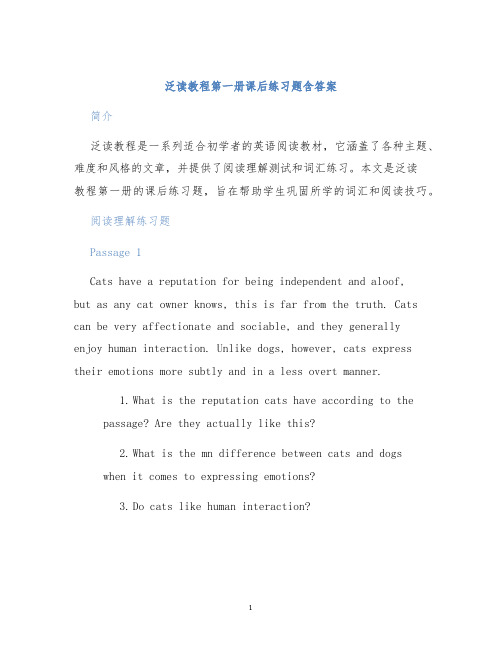
泛读教程第一册课后练习题含答案简介泛读教程是一系列适合初学者的英语阅读教材,它涵盖了各种主题、难度和风格的文章,并提供了阅读理解测试和词汇练习。
本文是泛读教程第一册的课后练习题,旨在帮助学生巩固所学的词汇和阅读技巧。
阅读理解练习题Passage 1Cats have a reputation for being independent and aloof,but as any cat owner knows, this is far from the truth. Cats can be very affectionate and sociable, and they generallyenjoy human interaction. Unlike dogs, however, cats express their emotions more subtly and in a less overt manner.1.What is the reputation cats have according to thepassage? Are they actually like this?2.What is the mn difference between cats and dogswhen it comes to expressing emotions?3.Do cats like human interaction?Passage 2The world’s largest coral reef system, the Great Barrier Reef off the coast of Australia, is suffering greatly due to climate change. While tourists flock to the reef to marvel at its beauty, rising sea temperatures are causing widespread coral bleaching, which in turn is destroying the delicate ecosystem. Many scientists are calling for urgent action to reduce greenhouse gas emissions in order to save this iconic natural wonder.1.What is the Great Barrier Reef? Where is it located?2.What is causing the widespread coral bleaching?3.What is the consequence of coral bleaching on theGreat Barrier Reef?Passage 3As the coronavirus pandemic swept across the globe in 2020, many businesses were forced to close and employees were ldoff or furloughed. The economic impact of the pandemic has been felt worldwide, with some industries suffering more than others. However, there have also been opportunities for innovation and growth, particularly in industries related to healthcare, technology and e-commerce.1.What was the effect of the coronavirus pandemic onbusinesses and employees?2.Which industries have suffered the most as a resultof the pandemic? Which ones have flourished?3.What opportunities have arisen as a result of thepandemic?词汇练习题以下是一些单词和短语,与上述阅读练习中的文章有关。
大学英语泛读教程1第三版王健芳答案
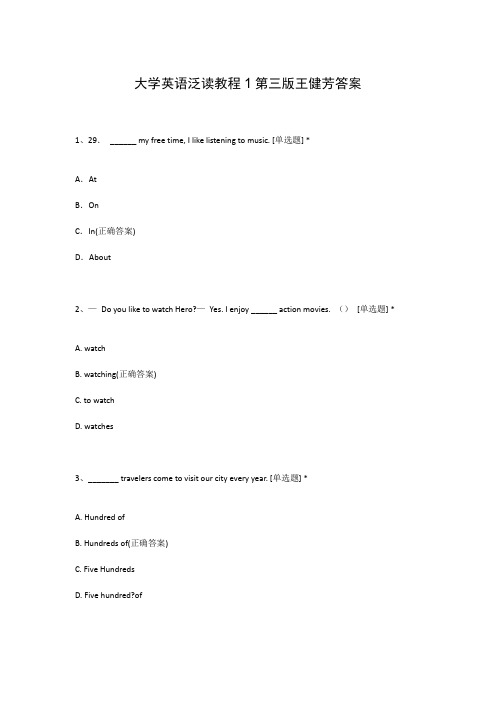
大学英语泛读教程1第三版王健芳答案1、29.______ my free time, I like listening to music. [单选题] *A.AtB.OnC.In(正确答案)D.About2、—Do you like to watch Hero?—Yes. I enjoy ______ action movies. ()[单选题] *A. watchB. watching(正确答案)C. to watchD. watches3、_______ travelers come to visit our city every year. [单选题] *A. Hundred ofB. Hundreds of(正确答案)C. Five HundredsD. Five hundred?of4、If people _____ overanxious about remembering something, they will forget it. [单选题] *A. will beB. would beC. wereD. are(正确答案)5、____ wants to see you. [单选题] *A. Somebody(正确答案)B. AnybodyC. All the peopleD. No people6、When you’ve finished with that book, don’t forget to put it back one the shelf, ____? [单选题] *A. do youB. don’t youC. will you(正确答案)D. won’t you7、30.I want to find ______ and make much money. [单选题] *A.worksB.jobC.a job(正确答案)D.a work8、53.On your way home, you can buy some fruit, meat, vegetables and ________. [单选题] * A.something else(正确答案)B.else somethingC.everything elseD.else everything9、No writer will be considered()of the name until he writes a work. [单选题] *A. worthlessB. worthy(正确答案)C. worthwhileD. worth10、Which animal do you like _______, a cat, a dog or a bird? [单选题] *A. very muchB. best(正确答案)C. betterD. well11、1——May I help you? You seem to be having some problems.——_______ , thanks. Ithink I can manage. [单选题] *A. All rightB. No problemC. It’s all right(正确答案)D. There’s no way12、______ the morning of September 8th, many visitors arrived at the train station for a tour.()[单选题] *A. FromB. ToC. InD. On(正确答案)13、I repeated my question several times. [单选题] *A. 到达B. 惊奇C. 重复(正确答案)D. 返回14、( ) ____ eye exercises ___ good __ your eyes. [单选题] *A. Doing, is, for(正确答案)B. Doing, are, forC. Do, is, forD. Do, are, at15、39.__________ he was very tired, he didn’t stop working. [单选题] * A.Although (正确答案)B.WhenC.AfterD.Because16、23.Susan doesn’t like cartoons. She would rather ______ Space War”. [单选题] * A.see (正确答案)B.seesC.seeingD.to see17、My mother’s birthday is coming. I want to buy a new shirt ______ her.()[单选题] *A. atB. for(正确答案)C. toD. with18、8.—Will she have a picnic next week?—________. And she is ready. [单选题] *A.Yes, she doesB.No, she doesn'tC.Yes, she will(正确答案)D.No, she won't19、--_______ I borrow these magazines?--Sorry, only the magazines over there can be borrowed. [单选题] *A. MustB. WouldC. May(正确答案)D. Need20、23.Hurry up! The train ________ in two minutes. [单选题] *A.will go(正确答案)B.goC.goesD.went21、57.Next week will be Lisa's birthday. I will send her a birthday present ________ post. [单选题] *A.withB.forC.by(正确答案)D.in22、Many of my classmates are working _______volunteers. [单选题] *A. as(正确答案)B. toC. atD. like23、Everyone here is _______ to me. [单选题] *A. happyB. wellC. kind(正确答案)D. glad24、6.Hi, boys and girls. How are you ________ your posters for the coming English Festival at school? [单选题] *A.getting onB.getting offC.getting with (正确答案)D.getting25、I run out of money. Could you _______ me some?[单选题] *A. lend(正确答案)B. sellC. borrowD. buy26、63.There will be? ? ? ? ??? water on the road after the heavy rain. [单选题] *A.too much(正确答案)B.much tooC.too manyD.many too27、—What ______ your sister ______ this Saturday?—Something special, because it’s her birthday. ()[单选题] *A. are; going to doB. is; going to do(正确答案)C. does; doD. did do28、The strawberries ______ fresh. Can I taste (品尝) one?()[单选题] *A. watchB. tasteC. soundD. look(正确答案)29、How I wish I()to repair the watch! I only made it worse. [单选题] *A. had triedB. hadn't tried(正确答案)C. have triedD.didn't try30、You’d ______ give up smoking. [单选题] *A. goodB. wellC. better(正确答案)D. best。
大学英语泛读_第一册_答案{全)
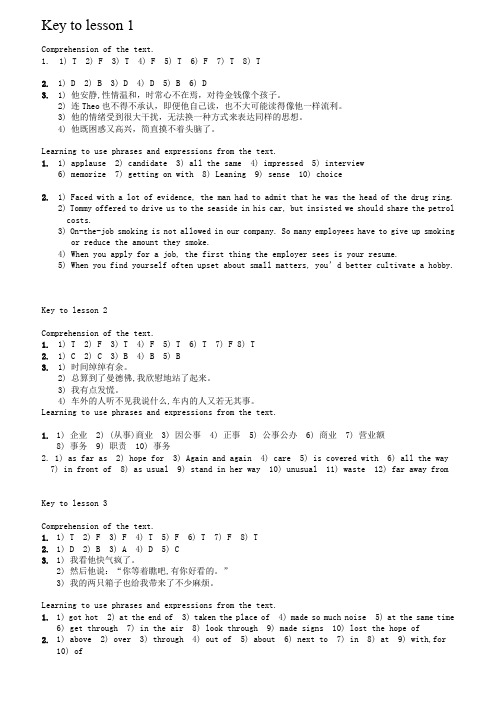
Key to lesson 1Comprehension of the text.1. 1) T 2) F 3) T 4) F 5) T 6) F 7) T 8) T2.1) D 2) B 3) D 4) D 5) B 6) D3.1) 他安静,性情温和,时常心不在焉,对待金钱像个孩子。
2) 连Theo也不得不承认,即便他自己读,也不大可能读得像他一样流利。
3) 他的情绪受到很大干扰,无法换一种方式来表达同样的思想。
4) 他既困惑又高兴,简直摸不着头脑了。
Learning to use phrases and expressions from the text.1.1) applause 2) candidate 3) all the same 4) impressed 5) interview6) memorize 7) getting on with 8) Leaning 9) sense 10) choice2.1) Faced with a lot of evidence, the man had to admit that he was the head of the drug ring.2) Tommy offered to drive us to the seaside in his car, but insisted we should share the petrolcosts.3) On-the-job smoking is not allowed in our company. So many employees have to give up smokingor reduce the amount they smoke.4) When you apply for a job, the first thing the employer sees is your resume.5) When you find yourself often upset about small matters, you’d better cultivate a hobby.Key to lesson 2Comprehension of the text.1.1) T 2) F 3) T 4) F 5) T 6) T 7) F 8) T2.1) C 2) C 3) B 4) B 5) B3.1) 时间绰绰有余。
英语泛读教程1第3版参考答案
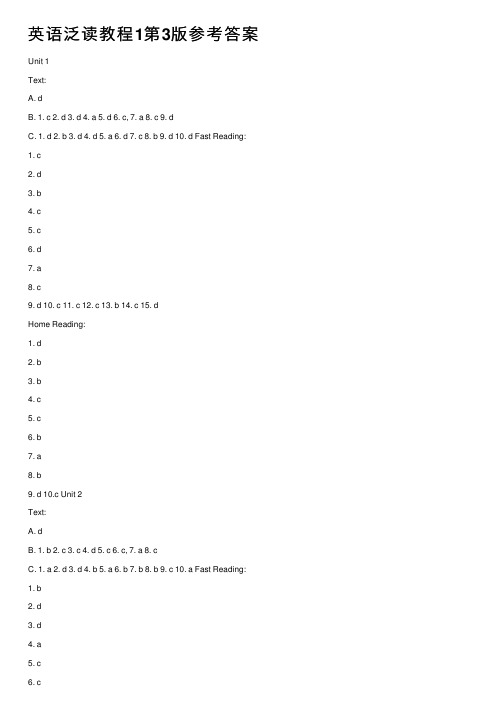
英语泛读教程1第3版参考答案Unit 1Text:A. dB. 1. c 2. d 3. d 4. a 5. d 6. c, 7. a 8. c 9. dC. 1. d 2. b 3. d 4. d 5. a 6. d 7. c 8. b 9. d 10. d Fast Reading:1. c2. d3. b4. c5. c6. d7. a8. c9. d 10. c 11. c 12. c 13. b 14. c 15. dHome Reading:1. d2. b3. b4. c5. c6. b7. a8. b9. d 10.c Unit 2Text:A. dB. 1. b 2. c 3. c 4. d 5. c 6. c, 7. a 8. cC. 1. a 2. d 3. d 4. b 5. a 6. b 7. b 8. b 9. c 10. a Fast Reading:1. b2. d3. d4. a7. d8. b9. c 10. a 11. d 12. d 13. d 14. c 15. dHome Reading:1. c2. d3. d4. c5. c6. d7. d8. d9. d 10. b 11. b 12. aUnit 3Text:A.cB.1.c 2.d 3.b 4.c 5.c 6、d 7.c 8.c 9.b10.d 11,d 12.cC.1.b 2.a 3.a 4.d 5.b 6.a 7.a 8.d 9.a 10.aFast Reading:1.b 2.c 3.c 4.d 5.b 6.c 7.b 8.a 9.c 10.c 11.d 12.d 13.d 14.d 15.b Home Reading:1.c 2.d 3.c 4.b 5.b 6.a 7.d 8.bUnit 4Text:A.cB.1.b 2.d 3.c 4.d 5.c 6.b 7.d 8.b 9.d 10.cC.1.a 2.a 3.b 4.d 5.a 6.d 7.b 8.d 9.c Fast Reading:1.c 2.c 3,d 4.a 5。
大学英语泛读期末试题答案
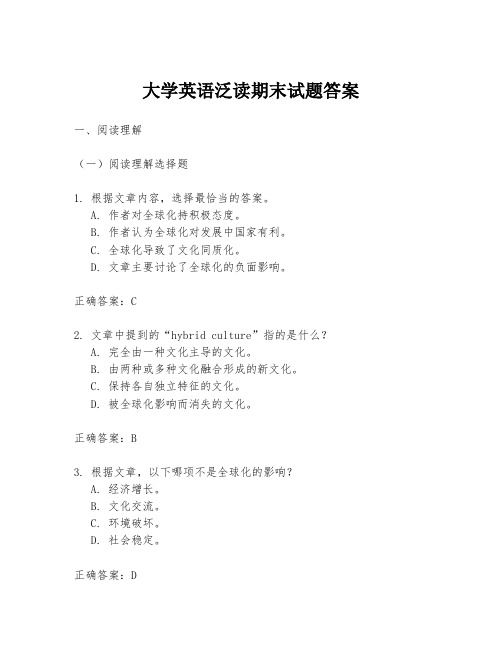
大学英语泛读期末试题答案一、阅读理解(一)阅读理解选择题1. 根据文章内容,选择最恰当的答案。
A. 作者对全球化持积极态度。
B. 作者认为全球化对发展中国家有利。
C. 全球化导致了文化同质化。
D. 文章主要讨论了全球化的负面影响。
正确答案:C2. 文章中提到的“hybrid culture”指的是什么?A. 完全由一种文化主导的文化。
B. 由两种或多种文化融合形成的新文化。
C. 保持各自独立特征的文化。
D. 被全球化影响而消失的文化。
正确答案:B3. 根据文章,以下哪项不是全球化的影响?A. 经济增长。
B. 文化交流。
C. 环境破坏。
D. 社会稳定。
正确答案:D(二)阅读理解简答题1. 简述作者对全球化的看法。
答:作者认为全球化是一个复杂的现象,它既带来了经济和文化的交流与发展,也带来了文化同质化和对本土文化的冲击。
2. 文章中提到的“cultural identity”是什么意思?答:“cultural identity”指的是一个群体或个体所具有的独特文化特征和属性,这些特征和属性使得他们在文化上有所区分和认同。
3. 根据文章内容,全球化对文化多样性的影响有哪些?答:全球化促进了不同文化之间的交流与融合,但同时也导致了文化同质化,使得一些独特的文化特征逐渐消失,从而对文化多样性产生了负面影响。
二、完形填空根据上下文,从所给选项中选择最合适的词汇填入空白处。
In today's world, the Internet has become an indispensablepart of our daily lives. It has 1 our access to information and 2 the way we communicate. However, the Internet is also a double-edged sword. While it 3 us to stay connected with friends and family, it can also lead to issues such as cyberbullying and privacy concerns.1. A) expanded B) limited C) complicated D) replaced正确答案:A2. A) accelerates B) disrupts C) restricts D) reduces正确答案:B3. A) tempts B) compels C) enables D) deters正确答案:C三、英汉互译(一)将下列英文句子翻译成汉语1. The rapid development of technology has brought about significant changes in our society.答:技术的快速发展给我们的社会带来了重大变化。
英语泛读教程Book1答案

ccdab 6-10: bdbca
11-15: caccb
Home Reading:
dbbcc
6-10: babdc
Book 1-Unit 5
▪ Text:
▪ A. c
▪ B. 1-5: dbdcd 6-10: cdadd
▪ C. 1-5: bbadc 6-10: cddad
▪ Fast Reading:
▪ 1-5: cdbbc 6-8: cdc
Book 1-Unit 14
▪ Text:
▪ A. a
▪ B. 1-5: cdbac 6-10: dabdb
11-12: bb
▪ C. 1-5: daadb
6-10: acaca
▪ Fast Reading:
▪ 1-5: cbdcb 6-10: dbddc 11-15: bcadd
▪ A. d
▪ B. 1-5: dacbd
6-8: dba
▪ C. 1-5: bacdb 6-10: abdab 11-12: ac
▪ Fast Reading:
▪ 1-5: dddad 6-10: abbbc 11-15: dacbb
▪ Home Reading:
▪ 1-5: baada 6-10: bddbc
6-10: bbccd
11-12: ca
▪ Fast Reading:
▪ 1-5: ccdcc 6-10: abcda 11-15: cabcd
▪ Home Reading:
▪ 1-5: ddbdc
6-8: ddb
Book 1-Unit 10
▪ Text:
▪ A. d
▪ B. 1-5: dbabd 6-9: cdbd
大学英语泛读第三版第一册课后答案
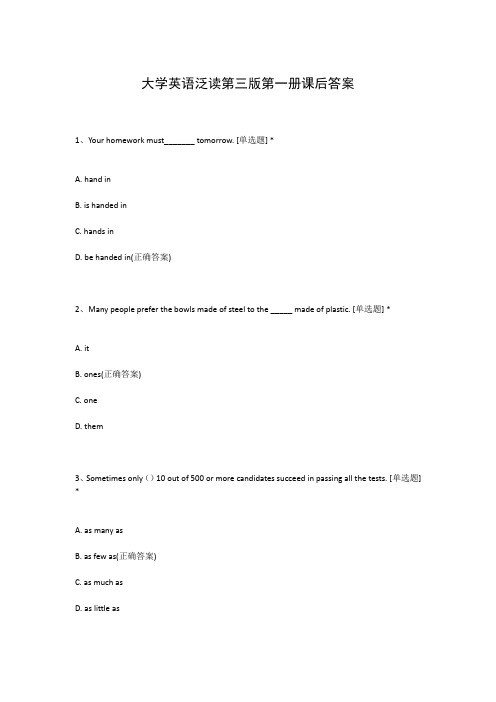
大学英语泛读第三版第一册课后答案1、Your homework must_______ tomorrow. [单选题] *A. hand inB. is handed inC. hands inD. be handed in(正确答案)2、Many people prefer the bowls made of steel to the _____ made of plastic. [单选题] *A. itB. ones(正确答案)C. oneD. them3、Sometimes only()10 out of 500 or more candidates succeed in passing all the tests. [单选题] *A. as many asB. as few as(正确答案)C. as much asD. as little as4、Patrick bought her two handbags as gifts,but _____ of them was her style. [单选题] *A. eitherB. noneC. neither(正确答案)D. all5、You can't see many _____ in a hospital. [单选题] *A. man nurseB. men nurses(正确答案)C. men nurseD. man nurses6、____ wants to see you. [单选题] *A. Somebody(正确答案)B. AnybodyC. All the peopleD. No people7、_____he was seriously ill, I wouldn’t have told him the truth. [单选题] *A.If I knewB.Had I known(正确答案)C.Did I knowD.Were I known8、Fresh _______ is good for our health. [单选题] *A. climateB. skyC. weatherD. air(正确答案)9、Our school is beautiful. How about _______? [单选题] *A. theirs(正确答案)B. theirC. theyD. them10、I am so excited to receive a _______ from my husband on my birthday. [单选题] *A. present(正确答案)B. percentC. parentD. peace11、—______ pencils are these?—They are Tony’s.()[单选题] *A. WhatB. WhereC WhoD. Whose(正确答案)12、I think you should buy this novel. It is really worth _____. [单选题] *A. reading(正确答案)B. being readC. readD. to read13、As soon as he _______, he _______ to his family. [单选题] *A. arrived, writesB. arrived, writtenC. arrived, wrote(正确答案)D. arrives, write14、Hurry up,?or we’ll _______ class. [单选题] *A. be late for(正确答案)B. late forC. late withD. be late with15、His father always _______ by subway. [单选题] *A. go to workB. go to schoolC. goes to bedD. goes to work(正确答案)16、John suggest _____ anything about it until they found out more facts. [单选题] *A not to sayB. not sayC to say notD not saying(正确答案)17、They were both born _______ March, 1 [单选题] *A. in(正确答案)B. atC. onD. since18、_______ your parents at home last week? [单选题] *A. IsB. WasC. AreD. Were(正确答案)19、He was born in Canada, but he has made China his _______. [单选题] *A. familyB. addressC. houseD. home(正确答案)20、()late for the meeting again, Jack! 一Sorry, I won t. [单选题] *A.Don’tB. Be notC.Don't be(正确答案)D.Not be21、Li Lei often takes a walk early ______ the morning.()[单选题] *A. atB. onC. in(正确答案)D. for22、1.________my father ________ my mother is able to drive a car. So they are going to buy one. [单选题] *A.Neither; norB.Both; andC.Either; orD.Not only; but also(正确答案)23、We have made a _______ tour plan to Sydney. [单选题] *A. two dayB. two daysC. two-day(正确答案)D. two-days24、16.We asked ______ engineer we met before to help repair the radio yesterday. [单选题] *A.aB.anC.the(正确答案)D./25、Almost every one of us could see her anxiety from the()on her face. [单选题] *A. appearanceB. feelingC. movementD. expression(正确答案)26、The firm attributed the accident to()fog, and no casualties have been reported until now. [单选题] *A. minimumB. scarceC. dense(正确答案)D. seldom27、Words are windows()you can look into the past. [单选题] *A. through which(正确答案)B. through thatC. whichD. whose28、You can ask()is on duty there tonight. [单选题] *A. WhatB. whomC. whoever(正确答案)D. whomever29、Which animal do you like _______, a cat, a dog or a bird? [单选题] *A. very muchB. best(正确答案)C. betterD. well30、What’s your _______ for the coming new year? [单选题] *A. playB. plantC. plan(正确答案)D. plans。
- 1、下载文档前请自行甄别文档内容的完整性,平台不提供额外的编辑、内容补充、找答案等附加服务。
- 2、"仅部分预览"的文档,不可在线预览部分如存在完整性等问题,可反馈申请退款(可完整预览的文档不适用该条件!)。
- 3、如文档侵犯您的权益,请联系客服反馈,我们会尽快为您处理(人工客服工作时间:9:00-18:30)。
Unit OnePassage 1Proverbs:1.As you sow, so you will reap.2.He who laughs last laughs the longest.3.Better beg than steal.4.Honesty is the best policy.Learning to use phrases ad expressionsI. 1. applause 2. candidate 3. all the time 4. impressed 5. interview 6.memorize 7. getting on with 8. Leaning 9. sense 10 choiceII. 1. Faced with a lot of evidence, the man had to admit that he was the head of the drug ring.2. Tommy offered to drive us to the seaside in his car, but insisted we should share thepetrol costs.3. On-the –job smoking is not allowed in our company. So many employees have to giveup smoking or reduce the amount they smoke.4. When you apply for a job, the first thing the employer sees is your resume.5. When you find yourself often upset about small matters, you’d better cultivate a hobby.Passage 2Proverbs1.Despair gives courage to a coward.2.Fortune favors the bold.3.When angry, count a hundred.4.When a man is angry, he can’t be in the right.Learning to use phrases ad expressionsI.. 1.企业 2 从事)商业 3 因公事 4 正事 5 公事公办 6 商业7营业额8事务II. 1. as far as 2. hope for 3. Again and again 4. care 5. is covered with 6. all the way7. in front of 8. as usual 9. stand in her way 10. unusual 11. waste 12. far awayfromPassage 3Learning to use phrases ad expressionsI. 1.got hot 2. at the end of 3. taken the place of 4. made so much noise 5. at the same time 6. get through 7. in the air 8. look through 9. made signs 10. lost the hop of II. 1. above 2. over 3. through 4. out of 5. about 6. next to 7. in 8. at 9. with,for 10. 0fUnit TwoPassage 4Proverbs1.Fine feathers make fine birds.2.Clean and whole makes poor clothes shine.3.Never judge from appearances.4.It is not the gay coat that makes the gentleman.5.Clothes do not make the man.6.Don’t throw out your dirty water until your get in fresh.Learning to use phrases ad expressionsI. 1. deep 2. notice 3. collect 4. thick 5. are catching 6. placed 7. follow 8.care9. heavy 10 turnII. 1. We went to bed that evening around 10:30 as usual.2. She left her kid with a friend and went to town.3. The walls on our house are only a few inches thick.4. The German base from which they had been attacked lay about sixty kilometers to the westof the front line.5. Although being early may mean wasting a little time, this will be less than if you miss thetrain and have to wait an hour or more for the next one.6. I had been told that the hotel was not beautiful but you were better fed there than in anyother place in London;--- and that was what I wanted then.Passage 5Proverbs1. Plan the whole year in he spring.2. April showers bring forth May flowers.3. A snow year, a rich year.4. The morning sun never lasts a day.Learning to use phrases ad expressionsI. 1. full of 2. bad for 3. ran after 4. cut down 5. cut off 6. enjoy 7. pass through8. knocked down 9. used to be 10. looked forward toII. 1. Day 2.sky 3. pouring 4. down 5. clear 6. shine 7. falls 8. made 9. sunny10. carrying 11. raining 12. afternoon 13. weather 14. conversation 15. discussPassage 6Proverbs1.One enemy can do more hurt than ten friends can do good.2. Nothing worse tban a familiar enemy.3. Better a thousand enemies outside the house than one inside.4. Believe no tales from an enemy’s tongue.5. Truth will come to light.6. Lift a rock only to drop it in one’s own toes.Learning to use phrases ad expressionsI. 1. accompanies 2. folded 3. hide 4. fetch 5. round the corner 6. suspected7. interviewed 8. missing 9. her turn 10. flicked throughII. 1. was hurrying 2. saw 3. coming 4. to avoid 5. crossed 6. was 7. being 8. to face9. had not brought 10. was 11. had liked 12. had left 13. had killed 14. knew15. had been told 16. to bring 17. had—trusted 18. werePassage 7Proverbs1.If you wish good advice, consult an old man.2. Years know more than books.3. The best wine comes out of an old vessel.4. Never too old to learn.5. As the old cock crows, so crows the young.6. An old man never wants a tale to tell.You can’t teach an old dog new tricks.Learning to use phrases ad expressionsI. 1. costs 2. dull 3. escape 4. improving 5. breathe 6. at least7. in large numbers 8. hit 9. possess 10. in a hurryII. 1.for 2. between 3. into, out of 4. about 5.on, on 6. past 7.behind, beside8. in 9. in 10. across 11. by 12. onPassage 8Learning to use phrases ad expressionsI. 1.evenly 2. reduce 3. extra 4. factor 5. emergency 6. destination7. relative 8. lightened/has lightened 9. will 10. tightlyIII. 1. Those who expect to have a good command of English within a few months should bear in mind that there is no short cut on language learning.2. It’s a great idea to stay overnight at your house, but I had better talk it over with my parentsin case they don’t agree.3. He advised me to make sure that the second-hand car was in good condition before I made adecision to buy it.4. I you don’t cut in half the members of the courses you ‘re going to take next semester, I’ msure you will be weighted down.5. As for my house in the countryside, I only live there every summer, I don’t intend to move infor good.Passage 9Proverbs1. I anything can go wrong, it will.2. The bread never falls but on its buttered side.3. Misfortunes never come singly.4. What is worse than ill luck?Learning to use phrases ad expressionsI. 1. act 2. questioned 3. puzzled 4. apologized 5. one of those days6. burst into7. ask for8. ordered9. perform 10. pick---upII. 1. One study showed that forty percent of those killed in car accidents could have been saved if they had been wearing seat belts.2. There were no holes in my pockets. How could I have lost the money?3. If Mike had not overslept, he might have caught the plane.4. More people might have taken the medicine if its side effects had not been so strong.5. You must have dialed the wrong number. I have been in the house the whole morning.6. I couldn’t have lost the office key, for I put all my keys on a key ring.7. I f the police had not come immediately, the quarrel might have turned into a fight.8. No one in this house has ordered flowers. You must have mixed up your orders.Passage 10Learning to use phrases ad expressionsI. 1. pace 2. sickness 3.whistled 4. flooded 5. feed 6. steady7. shelf 8. was frightened 9. equipment 10. roundedII. 1. covered 2. take, make 3. made 4. covered 5. cover 6. makes7. make 8. cover 9. take 10. took/ has takenIII. 1. In the early days when there were no planes, the journey from Shanghai to New York took several months.2. When he was young, he used to sit at the beach, gazing at the sea for a long time.3. Let him solve the problem in his own way. It’s no good explaining to him.4. He ought to have arrived here at 10 o’clock. Something must have gone wrong.5. They waited day after day, but the good news they had been expecting still didn’t come.Passage11Proverbs1.When Adam delved and Eve span, who was then a gentleman?2.The tree that God plants, no wine hurts it.3.Sow the wind and reap the whirlwind.4.Man does what he can, and God what he will.Learning to use phrases ad expressionsI. 1. embarrassed 2. beneath 3. borne 4. companions 5. crawled 6.crushed7. suitable 8. was sweating 9. subject 10. cultivateII. 1. make the universe2. make a suitable companion to help him3. make all kinds of beautiful trees grow4. make the man fall into a deep sleep5. make you and the woman hate each other6. make it (the ground) produce enough food for you7. make the soil produce something8. make him cultivate the soilIII.1. The man tricked the two girls into going with him by claiming that he could find well-paid jobs for them.2. Because if her bad waist, she often can’t fall into sleep until after midnight.3. Seeing a snake blocking her way, the frightened little girl called out to the people nearby forhelp.4. In order to hide from the police, one of the two cunning thieves pretended to be an old man inhis sixties while the other pretended to be his daughter.Passage12Proverbs1.When war begins, then hell opens.2.Wars bring scars.3.In war all suffer defeat, even the victors.4.If you want peace, you must prepare for war.5.Better an egg in peace than an ox in war.6.Of all wars, peace is the end.7.It is a great victory that comes without blood.Learning to use phrases ad expressionsI. pulling my leg 2. keep an eye on 3. out of hand 4. keep her at arm’s length5. turned a deaf ear to6. at his fingertips7. a big mouth8. leads---around by the noise9. lost his headII. 1. selling 2. suggested 3. collect 4. in 5. though 6. at all 7. To8. during 9. looking for 10. changed 11. to 12.forPassage13ProverbsLearning to use phrases ad expressionsI. 1. astonished 2. behaves 3. accused 4. description 5. weakness 6. cheerful7.wisdom 8. knowledge 9. deadly 10. encourageII. 1. with 2. from 3. of 4.without 5. in 6.out 7. in 8. offIII. 1. I know this job of mine isn’t well paid, but on the other hand I don’t have to work long hours.2. They have spent a great deal of money on the new hospital.3. I dare not go there for fear that he will see me.4. No wonder you’ve got a headache when you drank so much last night.5. It has taken a week to throw off my cold.6. I couldn’t move my legs. It was as if they were stuck to the floor.Passage 14Learning to use phrases ad expressionsI.1. If the doctor had worn a mask, hw would not have caught germs from the patient.2. If the thief had worn gloves, he would not have left hid fingerprints all over the place.3. If he were here, he would help me to get through the difficulties.4. I f the film had been shorter, it would have held children’s attention.5. I wish you would look at the positive side of your husband. He is hardworking andeasygoing.6. If there were a fire, your customers would be trapped inside. You have only one emergencyexit on the ground floor.7. The doctor suggests that I run two miles and do 50 sit-ups every day.8. If someone offered to pay for a holiday for me, I would go round the world.II. 1. to buy the house, the young couple got a loan from the bank and they had to pay back the loan in 20 years.2. Sue felt embarrassed when the teacher caught her peering at her neighbor’s test paper.3. Before you buy a car, you’d better know what services the car dealer offers.4. Ann strongly objected to her husband’s suggestion that she quit her job and stay home to lookafter the kids.5. We waited for Jack at the railway station for two hours, but he didn’t show up. So we had togo without him.6. The villagers resumed searching for the missing chills after the police brought two policedogs.Passage 15Learning to use phrases ad expressionsI. 1. pointed 2. scientific 3. continually 4. unbelievable 5. naturally 6. mysterious7. unusual 8. truthfully 9. unidentified 10. sightII. 1. A. the sound that a weapon makes B. an injection of a drug2. A. a sum of money kept in a bank B. description3. A. ability to understand or make judgments B. s meaning4. A. likely to have B. something being talked about5. A . give B. here/ there6. A. a person that somebody pays attention toB. be against, show oppositionPassage16Learning to use phrases ad expressionsI. 1. marvelous 2. attractive 3. vaguely 4. impractical 5. instructions 6. incurably7. excitedly 8. expression 9. collection 10 astonishedII. 1. over 2. to 3. out 4. at 5. on 6. to 7. with 8. away 9. in 10. toIII. 1. Although the twin brothers look alike, they haven’t much in common. One is good at sports whole the other is skilled at making things.2. Computer games are so attractive to the child that all day long the only thing he thinks aboutis how to go to the net bar without being discovered by his teachers and parents.3. I feel a bit jealous of Mary because she always does better than I in the examinations.Sometimes I feel like asking her how she is able to do well in her studies and to have enough time for play.4. Father will play chess with me when he is in the mood and if he wins, his face will light upwith joy.5. Seeing the young man throw waste paper on the ground, Mr. Smith couldn’t help going up to him and pointing out that he should not have done so.。
